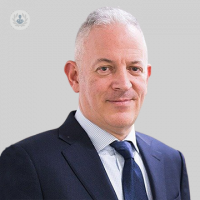What is a fistula?
Written in association with:The word ‘fistula’ refers to a channel between two parts of the body, and the Latin root for the word actually means ‘pipe’ or ‘flute’. You can develop fistulas in different parts of the body, but they will often form from an abscess that has not healed properly. Professor Richard Cohen is an experienced colorectal surgeon with particular expertise in treating fistulas, and here he provides a quick summary about them.

Make an appointment with Professor Cohen
What is a fistula and are there different types?
A fistula is an abnormal connection between two areas in the body. They can occur in different parts of the body:
- An anal fistula is an abnormal connection between the inside of the anal canal and the skin next to the anus
- A rectal fistula is an abnormal connection between the rectum and the skin
- A recto-vaginal fistula is an abnormal connection between the anus/rectum and the vagina
These connections are like “mini tunnels” between the two parts of the body. The “tunnels” can vary in size and, indeed, the larger the “tunnel” the worse the patient symptoms.
How serious is a fistula?
A fistula is not inherently dangerous but they can give rise to unpleasant symptoms, such as discharge and pain.
Is a fistula a sign of cancer?
No. Fortunately, malignant (cancerous) change in a fistula track is vanishingly rare.
What are the different types of fistula?
As described above, the fistula can be classified according to the parts of the body they connect. They are also classified according to their exact anatomical location in relation to the anal sphincter complex.
The simplest classification is into “simple” and “complex” fistula. The former is easy to treat and the latter can be extremely difficult to treat.
Can a fistula be cured?
A fistula can normally be cured, but it is the consequence of the cure process that your surgeon will discuss with you in detail.
I have studied anal and recto-vaginal fistula for my entire consultant career and have seen many new and clever techniques for treatment with minimal adverse consequences proposed and developed. Each treatment has its own potential chance of success and its own potential for adverse consequences.
Your surgeon will guide you through the choices and come up with a plan for your particular fistula.
The more complex fistula may require more than one operation to deal with them.
Some fistulas are associated with an underlying disease of the local tissues, such as Crohn’s disease. These require a multidisciplinary approach with a gastroenterologist and surgeon working together for the added benefit to the patient.


